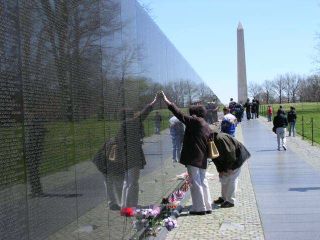Memory
How The Politics of Memory Affects Us All
Why the Vietnam War is not over—and how that matters.
Posted April 16, 2015

“The past is never dead. It’s not even past.” Faulkner, Requiem for a Nun.
This year brings a 50th anniversary commemoration of the Vietnam War sponsored by the Pentagon, complete with a website, interactive videos, and a $15 million price tag for taxpayers. Cost overruns are to be expected.
Commemoration? Is that quite the right word to describe a war, particularly the Vietnam War? And so another battle in this war has been opened, this time a battle around memory—one that has implications for us all.
A Pentagon spokesman described the event’s mission as helping “assist a grateful nation” to thank veterans and their families. A sort of major-league, “Thank you for your service.”
Many historians, scholars and social activists, however, see the Pentagon’s commemoration as a one-sided effort that glories and whitewashes the war. No one questions honoring our servicemen; it’s the nature of the history being taught that sparks worry. Several major symposia open to the public (see below) are planned now in Washington, DC, April 29th - May 2nd to educate and debate the real lessons of Vietnam. The politics of memory becomes apparent in the words of Tom Hayden, an early activist against the war: “the war-makers could win on the battlefield of memory what they lost on the battlefields of war.”
The Battlefield of memory
The battlefield of memory is very personal and very local. A few things stand out regardless of how you feel about the commemoration: the enormous impact that the Vietnam War had on those of us who either served or didn’t serve (either way the war shaped your coming of age in those years) and the ripple effects of Vietnam that trickle down through the generations to the present day.
When I ask friends and colleagues of a certain age, “were you affected by the Vietnam War?” I usually encounter a long silence. It’s as if people are silently asking, do you really want to know? I’m not asking a trivial question—for many people going back into memory can be a complicated experience. “Where to begin?” or “Ho, boy,” are common reactions.
Several people I emailed about their experiences replied that they’d prefer to meet in person and talk directly. Often this led to unexpected and touching conversations. Not only from those who served but also from those who did not.
Avoiding the draft can bring its own life- altering effects. One man graduated college in 1967 knowing he was about to be drafted. He did not want to go but also did not want to let down his father, who was a prominent member of their community. So, he married and applied to graduate school, making choices that in retrospect he wished he’d postponed. His draft board did grant him a draft exemption, particularly as a child was soon on the way. However, the marriage ended after a number of years and my colleague has often regretted that his adult life began in such a “foreclosed” way. “I married a perfectly nice woman, but neither of us was ready for marriage; particularly not under those circumstances.”
Uncle Sam Wants You

I don’t think you can overestimate the effect of facing difficult choices about being drafted as an adolescent or young adult. Those who have come of age since Vietnam may not realize the impact on people’s lives of a war fought by a draft army.
Avoiding the draft can create pockets of shame that last for years. I was not drafted, first having an educational deferment as a graduate student, then a high lottery number. However, I was very aware of not serving and underneath my principled opposition to the war lurked a scary, embarrassing question: Could I fight if I had to?
As luck would have it, my internship as a young psychologist was in a VA hospital, where I worked with many vets who had served and been profoundly wounded by their experiences. Throughout that experience I played dodge ball with the nagging internal question: How can I, who never served, be of help to those who have? What do I know of what they went through? Those questions leached into my self-esteem and likely contributed to my emphasizing teaching and research over clinical work early in my career. It took me years, and some very empathic supervision, to finally realize that I was a pretty good therapist.
Vietnam and the development of identity
Shame is an equal opportunity employer and those who served in Vietnam know about that. When I emailed a colleague of mine, about my age, if he had been affected by Vietnam, so many days went by without a reply that I wondered if he’d not gotten my message, or perhaps taken umbrage at it. Neither was true. When he did reply he reported from the battlefield of memory: “I’ve been thinking about your questions. You know how complex they are with many layers of meanings.” He went on to write about the crucial layer having to do with the development of identity. Experiences during the late adolescent/early adulthood years can have profound impact on developing identity.
It turned out that this man whom I’d known for years is a Vietnam Vet, a marine who’d seen combat, but somehow he’d never mentioned or talked about it. “Can an adolescent make an informed choice? Especially during the Vietnam era when the draft was active, when the country was in upheaval, when all of us baby boomers had childhoods informed by WWII/Korea veterans who didn’t get any psychological help. My ‘political’ consciousness wasn’t fully developed until my late 20's. “
My colleague wrote me about a relative of his “who is living the past and actively valorizes his identity as a Vietnam vet. On the other hand, I'm actively living in the present and diminishing my identity as a Vietnam vet. I was never a true believer (Once a Marine always a Marine). In identity development my relative is fixated at that time in his life. For me, it became a stage I passed through.”
My colleague goes on, though, to write to me about catching up with a friend he hadn’t seen in years, also a Vietnam vet: “Part of our conversation was about Vietnam and a shared awareness of shame. I said ‘I didn’t do enough, and maybe I did too much.’ A shift from shame to pride probably emerged in the vet community somewhere around the1990s.”
Shame and pride can coexist. My colleague went on to write: “Along with shame as a part of Vietnam vet identity I think there’s also a profound sense of powerlessness and vulnerability. About the war, about the reentry experience (ugly), and how much effort it takes to recover.”
Rippling Through The Generations
Tom Weiner’s book, Called To Serve is instructive here. The book consists of stories from men and women who dealt with the draft in myriad of ways during the Vietnam War—those who served, those who resisted, those who avoided the draft, those who left the country, those who were conscientious objectors, and those who counseled, loved, and helped draftees.
In an email, Tom told me that, “The War in Vietnam… reverberates all over the place for those impacted by it. Every one of the sixty-one people I interviewed was affected enormously when the war and/or draft landed upon them... as were their family members, friends, girlfriends, and they carry the residue, wounds/scars, emotions, fears, pride, etc…”
And what about the children of those who came of age during the Vietnam years? Tom writes: “As for reactions from the children of Vietnam era parents, the responses are many and varied and often a direct function of their parent’s experience of the war and its aftermath. “
Tom recounted that at a recent talk at a local university event on the history and meaning of the Vietnam War, one of the students told of his uncle who served, but has refused to talk about his experience. “That cannot help either the uncle or nephew and is sadly what still is happening for far too many veterans. But it isn’t just vets who don’t choose to share for a whole host of reasons. Numerous folks I interviewed who had protested the war also keep their stories hidden to avoid bringing back painful memories (definitely true for several who went to Canada whom I interviewed, especially the women/partners). Children whose parents have suffered the anguish of PTSD have the most to withstand and there are many stories written by such children of the hardships of such a life...”
Memory and our missing narratives
So much of what veterans and those who love them experience remains unspoken, part of the price paid for the way our country segregates war out from civilian life. "My father is a Vietnam vet, and I was born after he returned, but he never talks about what happened to him there," one woman told me. She wishes he would open up more because she can see he's been affected by his experiences and she feels painfully excluded from something so important.
Men and women who have seen combat can have difficulty putting their experiences into a coherent narrative. Vets wonder about how to make sense of it all. Will you listen to me? Can you understand? They may fear alienating the very people who express interest, as happened to one Vietnam vet recounted in Jonathan Shay’s excellent study, Achilles in Vietnam: At a family dinner the vet responded to his father-in-law’s invitation to “tell us what it was like over there”: “…I told them. And…within five minutes the room was empty. They were all gone, except my wife. After that, I didn’t tell anyone I had been in Vietnam.”
And so much of our feelings about what happened to them are difficult for us—the parents, children, spouses of vets—to put into words. We want to be supportive, but we often don’t know what to say or how to say it. And when you don't go into the service, you have to deal with your feelings about NOT being a vet. How come they went and I didn't? So, before we ever meet a vet we don't know, lots of feelings are generated. Feelings that can be difficult to share.
Veterans have important—essential—stories to tell. So do their parents, spouses, children, and friends. We all need to hear them. Those of us who served and those of use who did not serve often want to talk and feel heard, want to listen and to hear.
Here is where the cultural battlefield of memory merges with the personal. When our culture creates false narratives about the glory of war, merely thanking our veterans for their service and then silencing the other parts of their experience, we are re-traumatizing each other. What we need is fresh air—the opportunity to talk openly and directly about the costs of war, the heroism, yes, but also the shame and guilt and profound moral questions that come from asking young men and women to go into combat. Questions and memories that can last a lifetime.
Two upcoming symposia in Washington are “The Vietnam War Then and Now: Assessing the Critical Lessons,” April 29- May 1, 2015, sponsored by the Kroc Institute for Peace Studies (http://kroc.nd.edu/news-events/events/2015/04/29/1725) and “Vietnam: The Power of Protest,” Washington, DC, May 1-2, 2015, (www.lessonsofvietnam.org.)
Sam Osherson is the author of The Stethoscope Cure, a novel about war and psychotherapy, and is a Professor of Psychology at the Fielding Graduate University
References
Stolberg, Cheryl, “Paying Respects, Pentagon Revives Vietnam and War Over Truth,” NY Times, Oct 9, 2014.
Shay, J., Achilles In Vietnam: Combat Trauma and the Undoing of Character, NY: Simon and Schuster, 1995, p. xxxiii
Weiner, T. Called To Serve: Stories of men and women confronted by the Vietnam War Draft, Amherst, MA: Levellers Press, 2011.




